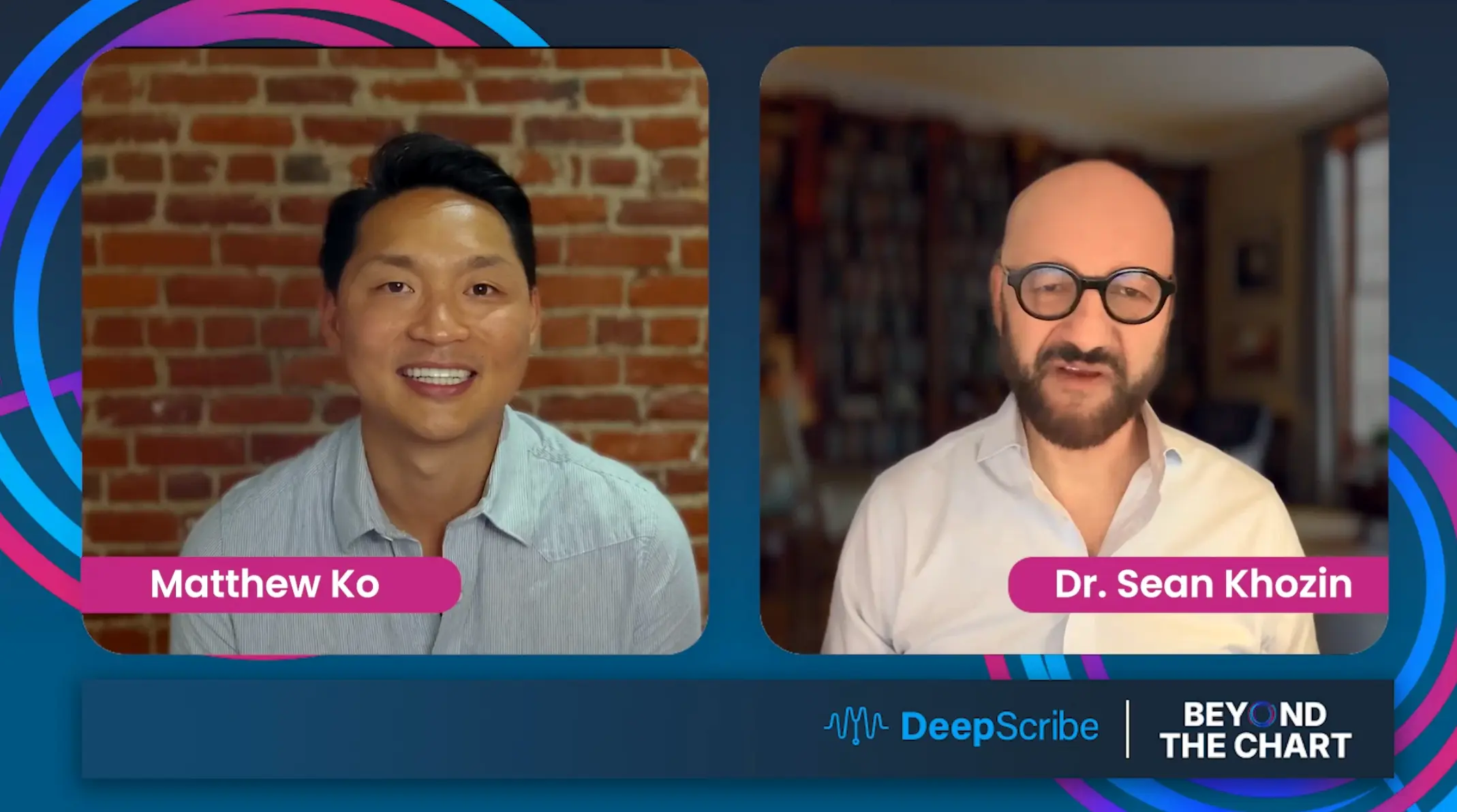What Clinicians Want Next From Ambient AI — and How DeepScribe Already Delivers
Clinicians are looking for ambient AI to come through in the future across 4 key areas. For DeepScribe clinicians, that future is now.


In their latest Impact Report, KLAS Research offers valuable insight into the evolving – and unfulfilled – expectations that clinicians have for ambient AI technology.
Ambient Speech Outcomes 2025: Combating Provider Burnout & Elevating the EHR Experience confirms what many already suspect: clinicians using ambient AI for documentation report a better EHR experience. After using ambient technology, more clinicians say their EHR is easy to learn and efficient, and supports patient-centered care.
But the most compelling element of the report follows. A section titled “What’s Next?” highlights four clinician priorities for ambient AI going forward – what healthcare providers say the technology should be doing.
DeepScribe already delivers on these four expectations for our clinicians and partner healthcare organizations.
Read on to find out how.
-----------
More Functionality for Specialists
From the report:
Specialists often view the tools as having limited functionality for the complexities of specialty care, saying they oversimplify or skip needed information, lack specialty-specific vocabulary, or don’t meet documentation needs.
In Ambient Speech Outcomes 2025, clinicians shared that many ambient AI tools fall short for specialists. Documentation can feel oversimplified, generic, or lacking in necessary vocabulary and structure.
Developing specialty-specific AI has been, and continues to be, the hallmark of DeepScribe, with a concerted focus on particularly complex specialties, notably oncology and cardiology.
This means carefully building tailored workflows and documentation structures, and developing AI models that recognize specific – often challenging – terminology.
<div class="blog_excerpt-block"><div class="blog_excerpt-text"><p>"In a specialty like mine there's so much specialty language. DeepScribe captures the odd drug names, the ones I can't even pronounce, it captures those almost 100%." - Susan Escudier, MD; Texas Oncology (see video)</p></div></div>
As a specific example, our ambient documentation for oncology includes pre-charting developed for cancer care, context-aware pull forward of previous notes, and automated interval history based on the clinical conversation – all of which are tailored to a specialty that has dense volumes of data, complex courses of care, and an essential need for precision documentation.
Expanded Capabilities Beyond the Note
From the report:
Providers see significant potential for ambient speech to be expanded… a need for AI to go beyond the note to help with things like orders, coding, and billing, which would positively impact downstream revenue.
The DeepScribe Ambient Operating System offers a complete scope of coding intelligence, for ICD-10, E/M, and HCC. Our platform uses details from the patient conversation to identify, extract, and recommend the right codes.
For healthcare organizations using DeepScribe, this intelligence helps ensure:
- Proper, full billing for the care delivered
- Improved accuracy for value-based initiatives
- Fewer denials and downstream inquiries
- A shorter revenue cycle
<div class="blog_excerpt-block"><div class="blog_excerpt-text"><p>Texas Oncology clinicians saw a 34% increase in ICD-10 codes over a 6-month period. (ASCO Quality Care Symposium, Sept. 2024)</p></div></div>
The AI also pulls relevant HCC codes before each encounter and prompts the clinician with conditions that need to be addressed during the patient visit. It even recommends new codes, more accurately reflecting the full burden of illness for each patient.
DeepScribe AI pre-charting brings is another significant time-saver for clinicians, preparig them for each patient visit - especially important in complex specialties like oncology, for which details and clinical needs are dense and unwieldy to search through.
Also, the Ambient Operating System will be identifying and organizing orders at the end of each visit, based on the conversation.
<div class="blog_excerpt-block"><div class="blog_excerpt-text"><p>“There are things DeepScribe captures you wouldn't just find if you're looking over CMS claims. Diagnoses get brought up during the visit that get captured as HCC codes that end up being very important for our overall score.” - Patrick Dermody, MD, Napa Valley Medical Group (see video)</p></div></div>
Continued Refinement to Decrease the Need for Editing
From the report:
Over the last 18 months, the most common problem providers have reported with ambient speech is inaccurate or clunky output that requires editing… providers would like to see continued fine-tuning and clear methods by which they can give feedback if they see repeated errors.
Producing precise, complete clinical notes has always been a top priority for DeepScribe, especially with our dedication to AI models that are custom-fit for each specialty.
Note generation must be more than transcription - it must include a deep understanding of specialty needs to properly maintain high clinical value and save clinicians from excess editing.
To understand and share the quality of our note output, we created the DeepScore quality methodology, with a series of metrics to measure note accuracy and quality. The rate of minimally edited notes with DeepScribe is at 95% – defined as the provider substituting fewer than 10% of words.
<div class="blog_excerpt-block"><div class="blog_excerpt-text"><p>"90 to 95% of the time I'm not making any adjustments to [the note]. I take a minute or two max to read it, just to make sure I'm satisfied with all the information that it has there." -Alberto Torres, MD, Assistant Chief Medical Officer, New York Cancer & Blood Specialists</p></div></div>
That’s the start. We are evolving our ambient AI platform with the most significant updates in over a year of improvements and specialty customizations.
Notes now flow more naturally, mirror the clinician’s own style, and even reuse relevant language from past notes. The result is documentation that feels not just correct, but personalized.
Clinicians are seeing a greater level of refinement with context-specific notes and a finer capture of their style and note preferences. DeepScribe also taps back into previous notes to learn and then closely replicate each clinician’s style.
Here’s what we’re hearing from early adopters:
“The version I started using this morning is insanely good.”
"This is a million times better than writing a note myself."
"Now, I’m excited to see patients."
Ability to adapt the tools to the provider’s voice & documentation style
From the report:
Providers may feel that AI-generated notes don’t represent their voice or conform to their personal style of charting.
We realized early that the key to widespread AI adoption was customization. Clinicians want the ability to easily customize AI-generated notes to their specifications, to ensure the notes read and sound like them. As we like to say, “your notes, your way.”
This has been accomplished via the Customization Studio, an easy-to-use tool that offers 50+ details for clinicians to choose from, with specific options per specialty. This has played a key role in healthcare organizations seeing DeepScribe adoption rates of 80% and higher.
As mentioned above, our latest advances produce those clinician preferences more naturally and with greater specificity, learning directly from previous clinician notes.
What kind of preferences? Ways in which the note is organized and displayed. How to refer to the patient. Which macros to use automatically based on the conversation.
In specialties like oncology, in which notes are referenced by collaborative care teams, having an AI-generated note reflect your voice is invaluable.
<div class="blog_excerpt-block"><div class="blog_excerpt-text"><p>“We've seen utilization rates of 70, 80, 90% because the physicians are seeing the value. They didn't know that they could just set it up and be moving 100% forward in such a short amount of time – after their first note.” - Mike Marino, VP of Operations; Texas Oncology (see video)</p></div></div>
-----------
Delivering the ambient AI standard for specialty care
This latest report from the KLAS Research Arch Collaborative reveals current ambient AI outcomes and future ambient AI expectations. While the technology is making meaningful improvements in clinicians’ interactions with the EHR, providers want and need more: less need for editing, greater customization, and value beyond the clinical note.
At DeepScribe, these aren’t distant goals. They’re the standard we’re setting today. We’ve spent years listening to what clinicians want and building toward it. The result is an ambient experience that works not just for clinicians, but with them.
We have found that success can be measured by clinician adoption and regular utilization. To achieve rates of both, an ambient tool must be easy to implement and use, and satisfh clinicians’ desires for a personalized note that focuses on their specialty, workflows, and preferences.
This is just some of what we’ve learned in our ongoing cooperative development with clinical leaders across the country. Their insights continue to help us make the future of ambient AI available now.
text
Related Stories
Realize the full potential of Healthcare AI with DeepScribe
Explore how DeepScribe’s customizable ambient AI platform can help you save time, improve patient care, and maximize revenue.




